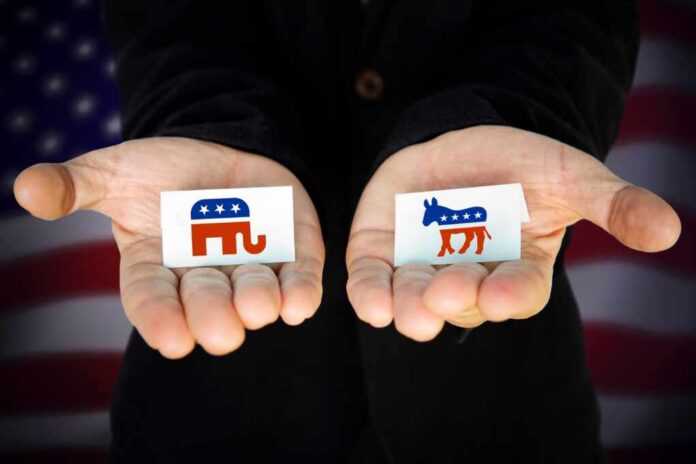
Millions of taxpayer dollars intended for presidential campaigns were squandered on extravagant party conventions filled with expensive decorations, luxury hotels, and even speech coaching for politicians.
At a Glance
- From 1976 to 2012, both Democratic and Republican National Committees received millions from the Presidential Election Campaign Fund for conventions
- In 2012 alone, each party received $17.7 million (equivalent to $50.2 million today) for convention activities
- Dr. Tom Coburn’s “Wastebook” exposed these expenditures, leading to reforms in 2014
Money previously used for conventions was redirected to pediatric medical research - High costs continue to pose barriers for delegates, with expenses reaching up to $10,000 for those from distant locations
Taxpayer Money Funding Political Festivities
For nearly four decades, American taxpayers unknowingly funded lavish political party conventions through the Presidential Election Campaign Fund. From 1976 to 2012, both the Democratic and Republican National Committees received millions of dollars that were intended to support presidential campaigns but were instead diverted to finance extravagant convention activities. The scale of this spending reached its peak in 2012 when each party received $17.7 million for their conventions—an amount that would equal approximately $50.2 million in today’s dollars.
“Wastebook,” a report compiled by Dr. Tom Coburn, exposed how these funds were spent on “entertainment, catering, transportation, hotel costs, production of candidate biographical films” rather than substantive campaign activities that would better inform voters about candidates and issues.
The revelation of these expenditures sparked significant concern among fiscal conservatives and government watchdogs. Rather than using the money to educate voters or improve the electoral process, millions were being channeled into what amounted to extravagant political parties. This wasteful spending continued for decades before meaningful reforms were finally implemented in 2014, redirecting these funds to pediatric medical research—a cause few could argue against.
The Hidden Costs of Modern Political Operations
While the direct taxpayer funding of conventions has ended, questionable financial practices within national committees continue. A ProPublica investigation revealed that Richard Walters, chief of staff at the RNC, earned $238,266 in salary while receiving an additional $135,000 through a shell company called Red Wave Strategies for “political strategy services.” This arrangement effectively obscured his total compensation from immediate public scrutiny, raising questions about transparency in campaign finance.
“A serious reporting violation. It seems pretty blatant. Hiding the recipient undermines the purpose of disclosure. The question is, why are they enriching him in this particular way?” said Larry Noble, former general counsel at the Federal Election Commission.
Even Michael Steele, former RNC chairman, criticized such arrangements as “sweetheart deals” that “just smells” bad for an organization responsible for handling donor contributions. These financial practices affect not only internal morale but potentially undermine donor confidence in how their contributions are being managed. The RNC has also made payments benefiting connected individuals, including nearly $2 million for Trump properties and over $100,000 for Donald Trump Jr.’s book.
Delegates Bearing Personal Financial Burden
While national committees manage millions in funds, individual delegates face significant personal expenses to participate in the political process. Attending a national convention typically costs between $3,000 and $4,000 per person for a single week—an amount many working Americans would find prohibitive. These costs include hotel rooms ranging from $300 to over $800 per night, transportation, meals, and other incidental expenses required to participate in what should be an accessible democratic process.
“I was surprised that the party, which is a national organization, had not negotiated better group rates considering that they have guaranteed occupancy,” noted Virginia Ramos Rios, reflecting the frustration of many delegates faced with high costs.
The financial burden has become so severe that many delegates now resort to crowdfunding platforms like GoFundMe to raise money for their expenses. Others share accommodations or stay with friends to reduce costs. For delegates from distant locations like Guam and Puerto Rico, expenses can reach up to $10,000—creating a significant barrier to participation for those not financially well-off.
“These people are taking on debt to participate in the process,” observed Raymond Braun, highlighting how the high costs effectively limit participation to those with substantial personal resources or organizational backing.
Economic Impact on Host Cities
The promise of economic benefits for cities hosting these conventions often falls short of expectations. While the 2024 Republican National Convention in Milwaukee was projected to bring $200 million in revenue to the city, local business owners expressed skepticism about these estimates. Many reported disappointing reservation numbers and questioned whether the economic benefits would reach small local businesses rather than just major hotel chains and venues.
Despite the end of direct taxpayer funding for convention activities, security for these events remains publicly funded—continuing to place a financial burden on taxpayers. The reforms prompted by Dr. Coburn’s exposure of wasteful spending addressed only part of the problem, while the broader issues of excessive spending, insider arrangements, and limited accessibility continue to challenge the integrity of our political process.

























